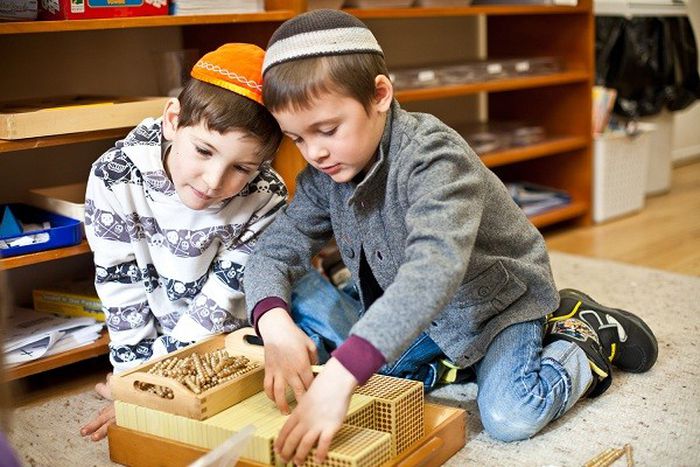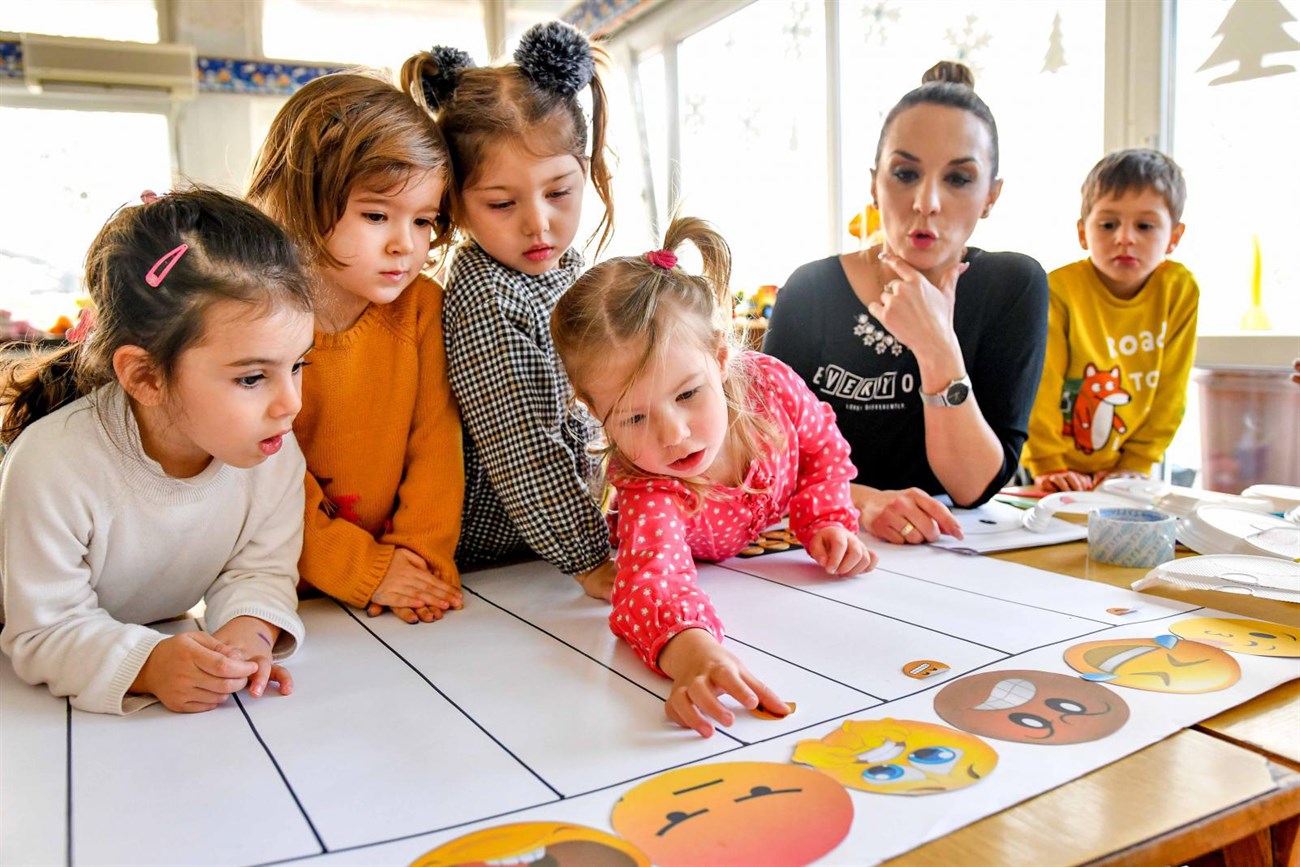Encouraging Children to Foster Independence
In the Jewish culture, it is customary to instill independence in children from a young age. Parents teach their children essential life skills, such as self-feeding and utilizing utensils, encouraging them to perform age-appropriate tasks independently. A notable demonstration of this is observing Jewish toddlers confidently dining alone at local cafes in Israel, despite their tender age.
Jewish parents consistently cultivate an environment that fosters independent learning and self-sufficiency in their children, while prioritizing their health. In contrast, many Vietnamese parents tend to doubt their child’s capabilities at a young age, resulting in continued dependency and even feeding them daily. This reliance on parental support impedes the child’s ability to thrive and achieve success later in life.

Suggest Instead of Giving Orders
Parents encourage their children to make their own decisions rather than dictating what they should do, recognizing that imposing rules can be oppressive. Instead of constantly monitoring their children, parents offer guidance and allow them the freedom to explore within a safe environment of their own.
In the realm of education, there exist pros and cons to this particular approach. The child, while being given the freedom to make choices, may encounter times when their judgement proves inaccurate, leading them to feel disheartened and disinterested. Jewish parents, however, display an exceptional level of openness towards such mistakes and failures, actively assisting their children in moving forward. In the event of a child receiving subpar grades in school, Jewish parents refrain from criticizing them, instead opting to collaborate with their child to identify the underlying issue and develop effective solutions.

Study Reveals Importance of Promptly Praising Your Child
In Jewish culture, parents consistently shower their children with praise, even when the children may not fully comprehend the language used. From simple achievements like drawing or speaking, parents go out of their way to acknowledge and praise their children for these specific actions. What sets Jewish families apart is their tendency to offer this praise in public settings, further highlighting their respect, presence, and status within society.
When a child achieves notable and commendable accomplishments, it is customary for parents and family members to express their admiration and congratulations. Such gestures not only contribute to the child’s self-esteem, but also foster a resilient attitude towards learning and work.

Trusting Your Child to Gain Independence: A Parental Guide
Jewish parents place a great deal of trust in their children’s abilities, and they believe that their children will excel in any task they are assigned. Even when their child achieves remarkable accomplishments, such as receiving a high score or winning a contest, these parents reward their child with unwavering trust.
However, Vietnamese parents tend to give their children candy or a favorite toy as a reward. In contrast, the Jewish approach to education stands out as they place trust in their children as the ultimate reward. This approach signifies the growth and maturity of their child and goes beyond material gifts.

Learn How to Embrace Messiness and Stop Struggling with Organization
Jewish parents recognize that children possess a natural curiosity and playfulness, which evolves as they grow older. Thus, when engaging in recreational activities, parents grant their children the autonomy to independently arrange their preferred toys, devoid of any fear of reprimand or intimidation.
Jewish parents adopt a nurturing approach by refraining from scolding their children for being untidy. Instead, they provide an environment that encourages unrestricted play and exploration, thereby fostering cognitive development.

“Encouraging Kids to Explore: Let Them Discover the World”
Jewish parenting is distinct in its approach to disciplining children. Unlike some parents who resort to physical punishment, Jewish parents prioritize nurturing and guiding their children without the use of a whip. Recognizing the natural energy and curiosity of children, Jewish parents encourage their little ones to channel their energy into constructive activities and play, allowing them to freely express their vibrant spirits.
Jewish parents value the importance of providing their children with the freedom to explore their interests and the world around them. They believe that this approach to education will enable their children to develop confidence and thrive in their adult lives.

Education Minister Highlights the Importance of Recognizing Every Child’s Efforts
In Jewish culture, parents highly value the efforts of their children and believe that every accomplishment, no matter how small, deserves recognition. They take great pride in praising even simple achievements, such as squiggly words written on a napkin, and enthusiastically share these moments with the whole family, treating them as precious keepsakes.
Jewish education promotes a nurturing and empowering environment for children, fostering confidence and happiness in their accomplishments. By prioritizing this educational approach, Jewish communities aim to cultivate a mindset that fosters stronger efforts, positive development, and greater achievements in the future.

“Encourage Positive Language and Affirmation towards Your Child”
Jewish parents refrain from using negative language when addressing their children. Instead, they choose to replace statements like “You’re bad” or “You’re lazy” with more positive and constructive communication. For example, they might say, “Why would a usually obedient child like you engage in such unfortunate behavior?”
Parents always ensure that they communicate with their children in a respectful and constructive manner, even in the presence of others. They possess a keen understanding of their children’s flaws and misbehavior, and employ adept strategies to shape their behavior and guide them towards positive development, all while maintaining privacy and independence from external influences.

Take Responsibility for Your Actions: 10 Tips
Jewish individuals place significant emphasis on personal responsibility and strive to be exemplary role models for their children. They exercise caution and approach all activities and decisions with a sense of seriousness, demonstrating their commitment to setting a positive example.
When children make mistakes, responsible parents always teach them the importance of taking responsibility for their actions. This valuable lesson helps children become aware of their actions and mistakes, allowing them to grow and improve their behavior in the future.

Teaching Children Time Management Skills
Children are taught valuable life lessons from a young age, including the importance of hard work and effective time management. In the Jewish culture, parents prioritize providing their children with a well-rounded education that encompasses various skills and subjects. Alongside core subjects like English and math, children may also learn to play the violin, among other pursuits. This emphasis on multifaceted learning allows children to develop a diverse range of abilities while ensuring they have ample time for each endeavor.
If a child’s parents are involved in business, the child may have the opportunity to join the family business at a young age. This early involvement provides valuable experiential learning opportunities for the child, teaching them important skills such as time management, work organization, and perseverance.

Take Risks to Achieve Success: Here’s Why It’s Worth It
Jewish parents commonly impart the following wisdom to their children: “Let us forge ahead.” This saying emphasizes the importance of proactive growth, urging individuals to continuously develop themselves and strive for personal success. Jewish parents encourage their children to step out of their comfort zone, explore new horizons, and take responsibility for their own challenges.
This content is designed to provide children with valuable lessons on confidence, failure, and victory. Parents play a crucial role in monitoring their children’s activities and offering timely praise and encouragement. By doing so, parents help children develop resilience in pursuing their goals and being unafraid of taking risks.

We hope that the above article has provided you with valuable insights into Jewish parenting methods. If you have any further questions or concerns, please feel free to leave a comment below!




































